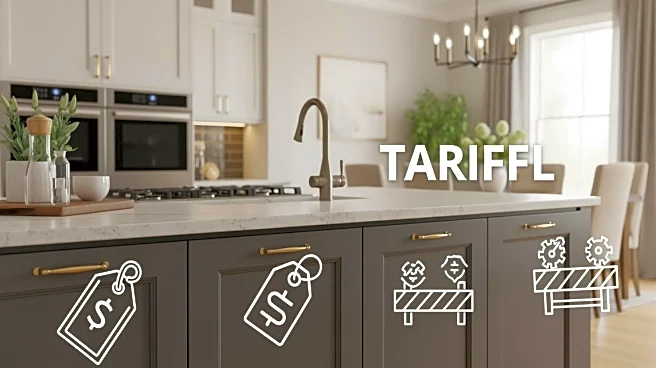What's Happening?
President Trump has announced new tariffs on imported kitchen cabinets, bathroom vanities, and upholstered wooden furniture, effective immediately. The tariffs are set at 25% until the end of the year, increasing to 50% starting January 1. This move is part
of a broader strategy to address national security concerns and foreign trade practices. The tariffs are expected to affect the remodeling industry, with potential customers possibly delaying renovations due to increased costs. Despite high mortgage rates affecting home sales, remodeling activity is predicted to remain steady. The American Kitchen Cabinet Alliance and other trade groups have supported the tariffs, aiming to counteract the influx of cheap imports from countries like Vietnam, Malaysia, and China.
Why It's Important?
The tariffs could significantly impact the U.S. home renovation market, potentially increasing costs for consumers and affecting demand for imported products. While some businesses may absorb the costs to maintain customer demand, others might face challenges due to the globalized nature of the kitchen cabinet industry. The tariffs aim to boost domestic production, but the reliance on imported materials could complicate this goal. Companies that do not rely on imports may benefit from increased demand for American-made products, although they face the risk of supply chain strain if demand surges unexpectedly.
What's Next?
As the tariffs take effect, businesses in the home improvement sector will need to navigate the changing landscape. Importers may become more selective in their product offerings, focusing on bestsellers and high-margin items. Domestic manufacturers could see increased interest, but they must prepare for potential supply chain challenges. The remodeling industry will need to adapt its messaging to reassure consumers about the impact of the tariffs on pricing and product availability.
Beyond the Headlines
The tariffs highlight the complexities of global supply chains and the challenges of balancing protectionist policies with industry realities. While intended to protect U.S. businesses, the tariffs may inadvertently raise costs across the supply chain, affecting both domestic and international stakeholders. The situation underscores the need for strategic planning and adaptation in a highly globalized industry.
















